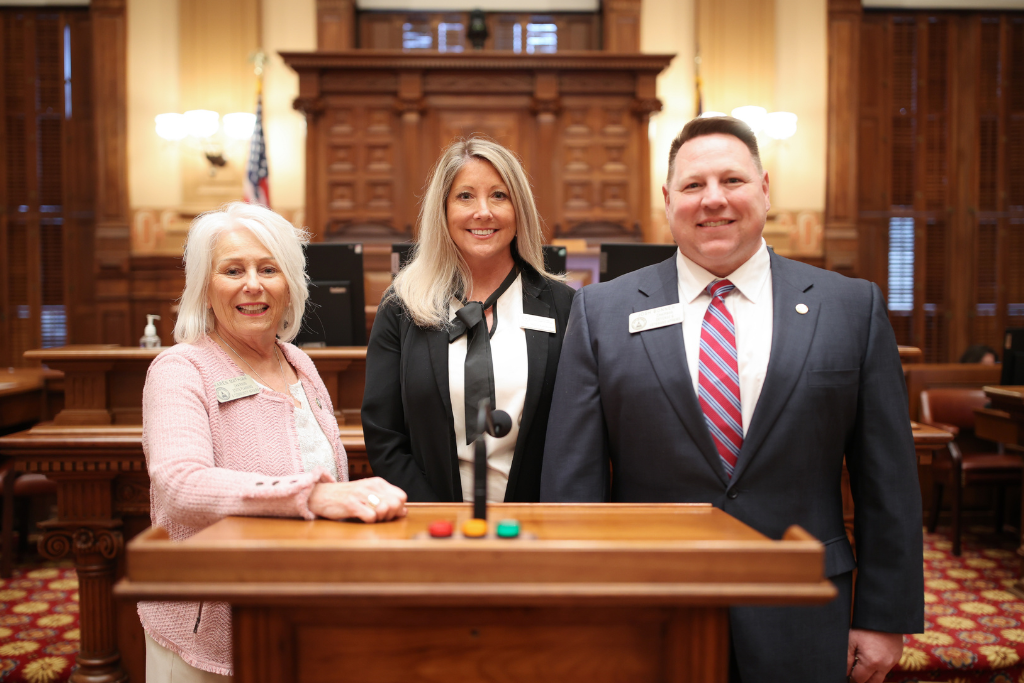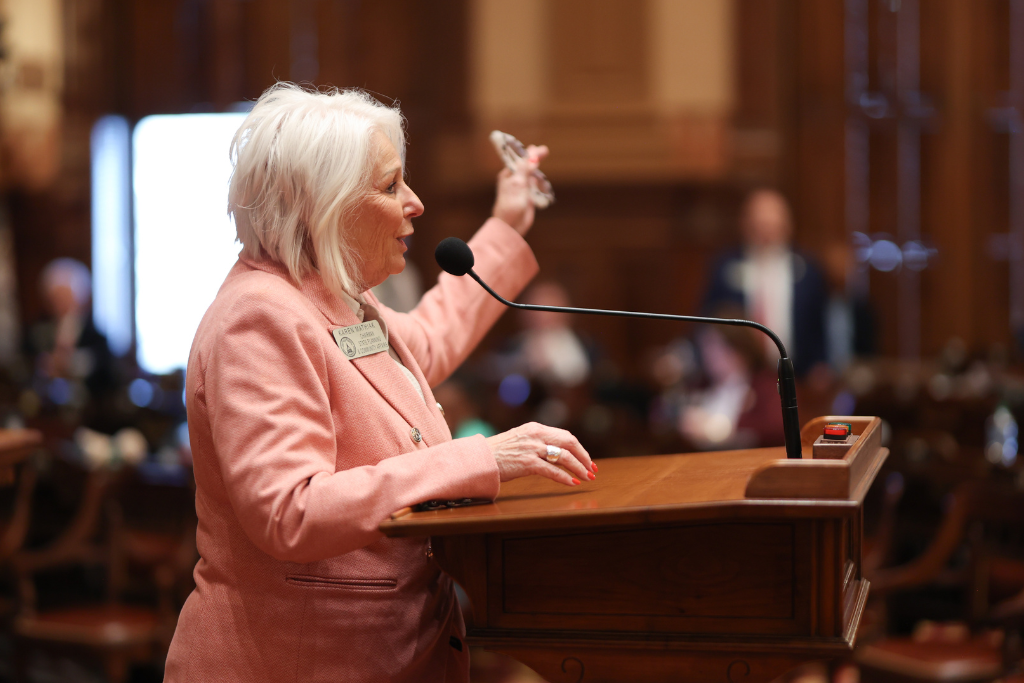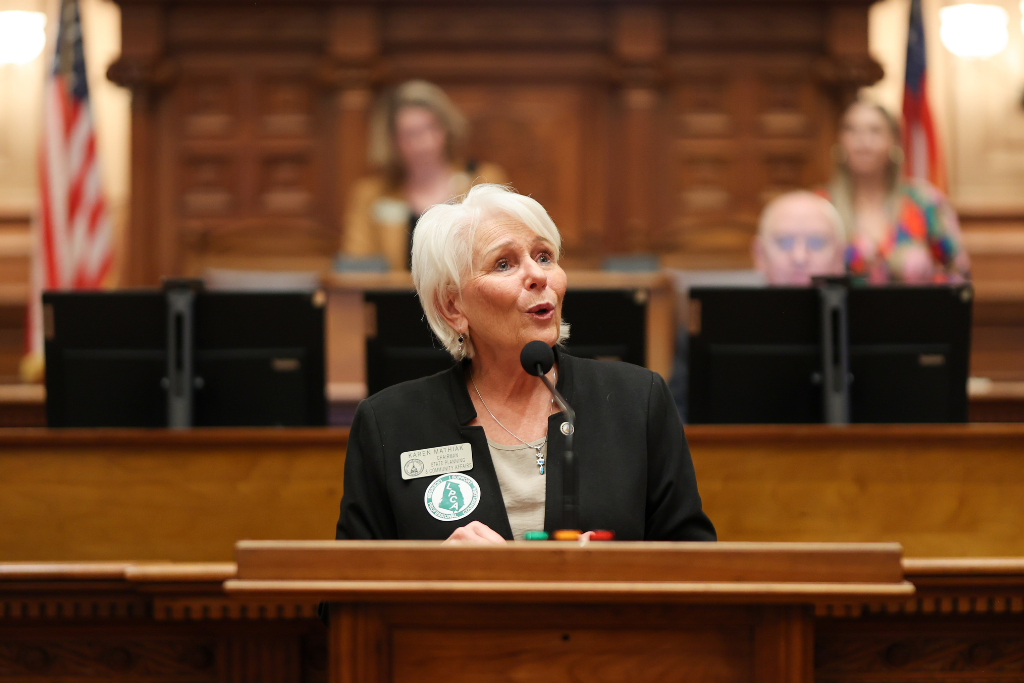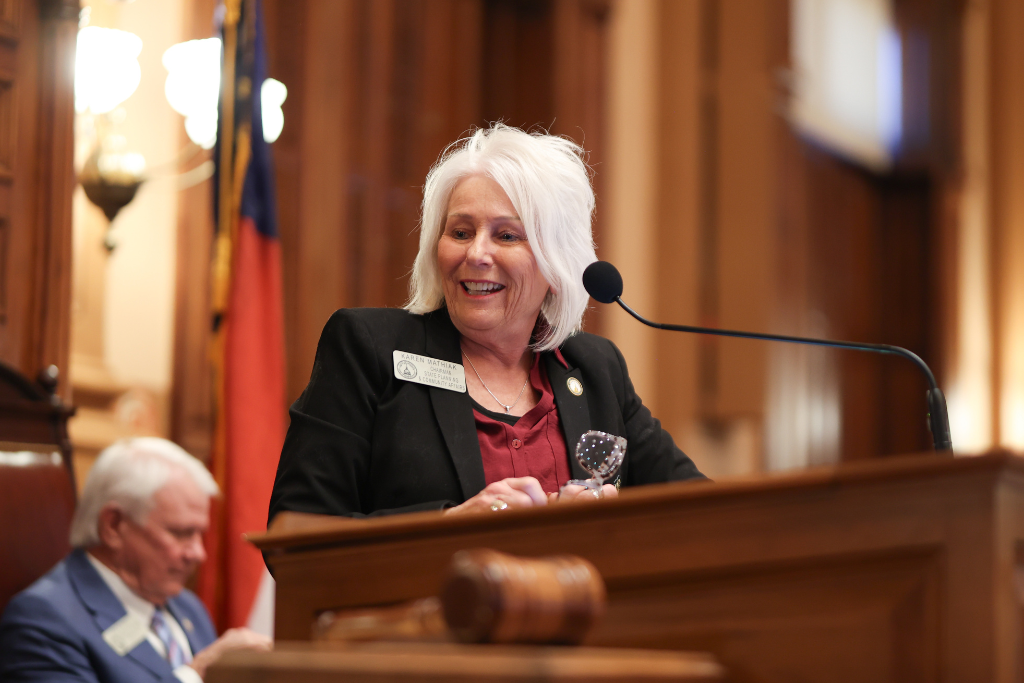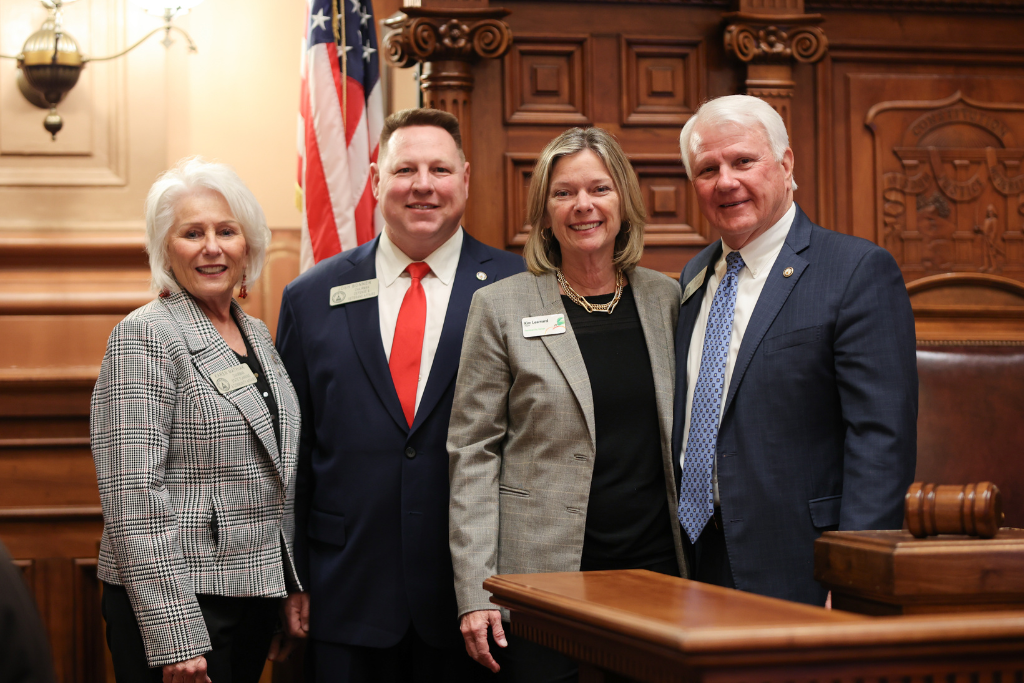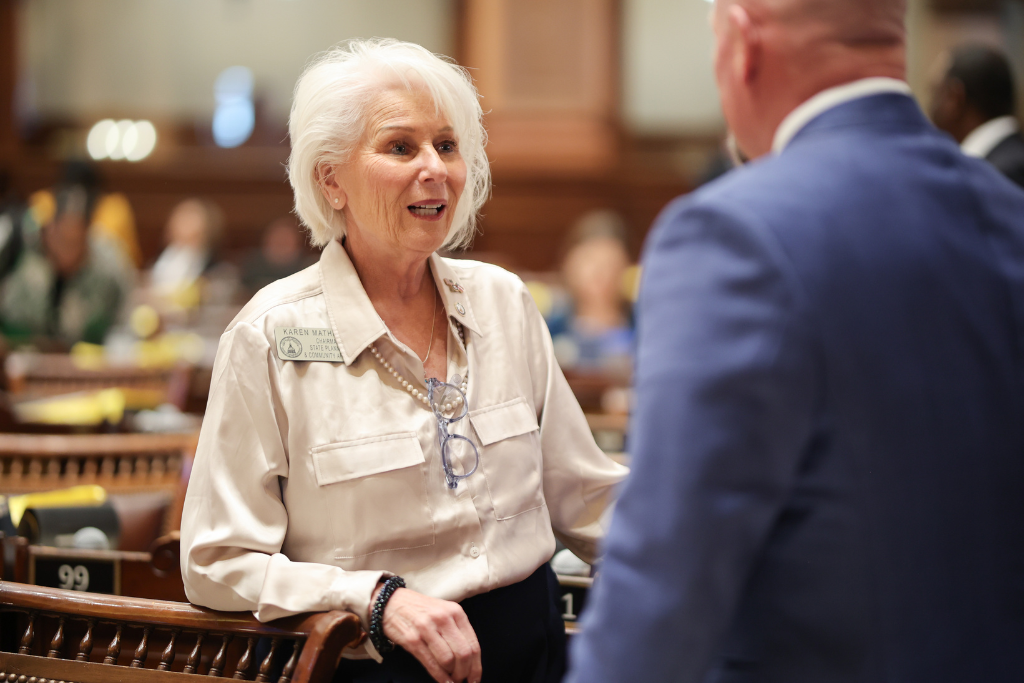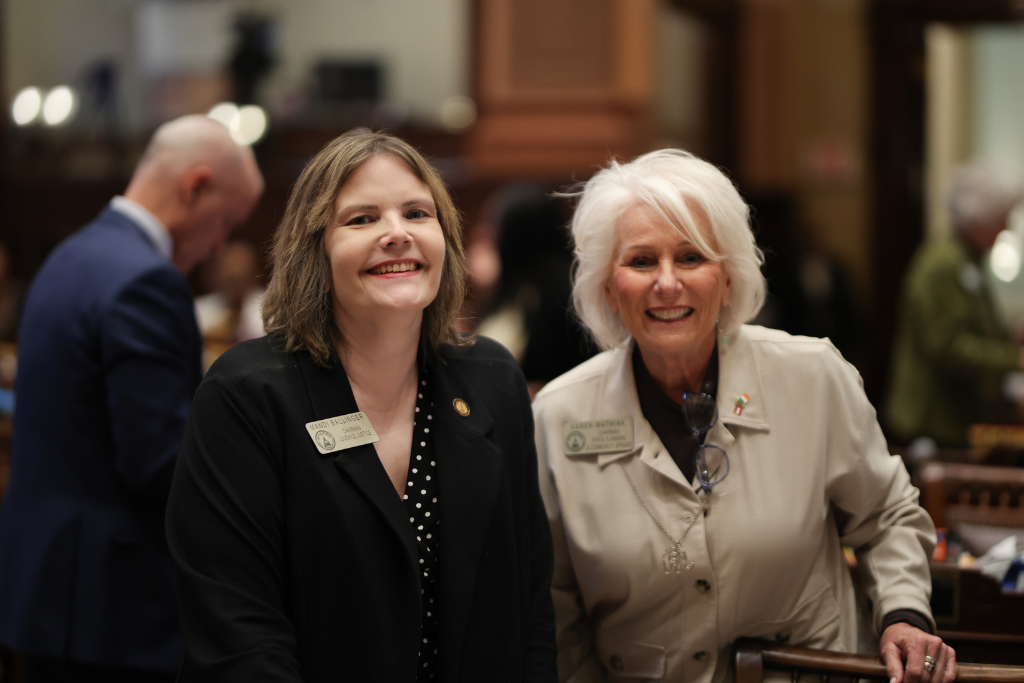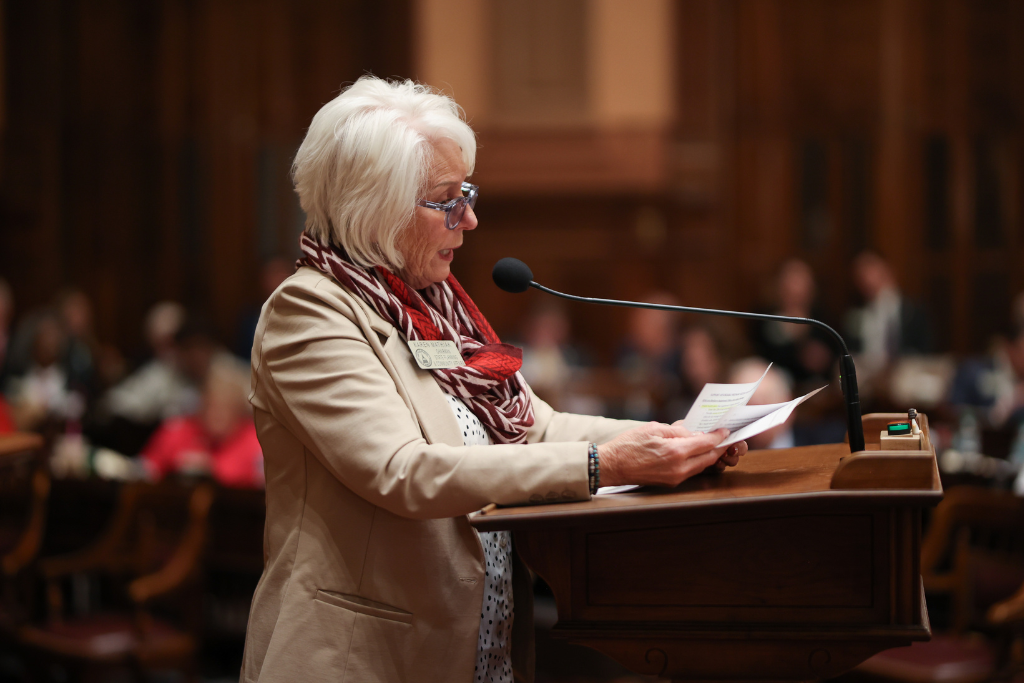Week 5 Legislative Session Recap 2024
February 6-9, 2024
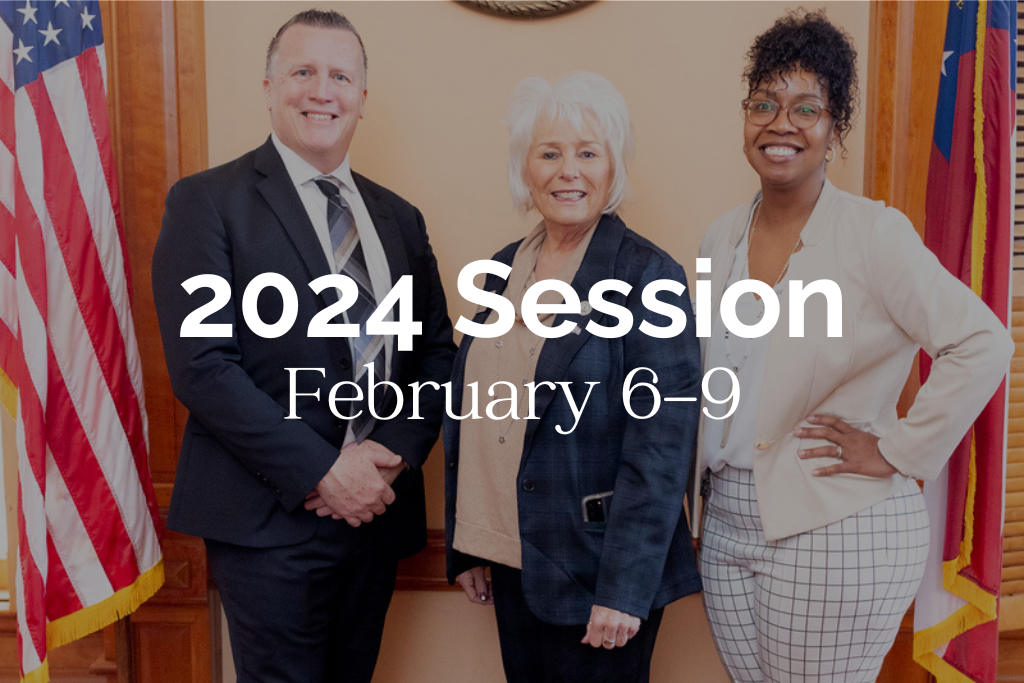
The Georgia General Assembly returned to the State Capitol on Tuesday, February 6 for a busy fifth week of the 2024 legislative session. The House assembled for four days, and our days are certainly getting longer and busier as we move further along in the session. This week, we successfully gave passage to several bills and also continued our committee work each day. Some highlights of the week include the passage of the House’s version of the Amended Fiscal Year 2024 budget (AFY 2024), among other bills, as well as the convening of a joint legislative session for the annual State of the Judiciary address.
The Amended Fiscal Year 2024 budget, or House Bill 915, is set at a revenue estimate of approximately $37.5 billion. Governor Kemp’s estimate for the amended budget includes $2 billion in surplus funds, bringing the total to $5 billion, and marking a 15.6 percent increase from the original estimate. The Amended FY 2024 budget provides substantial investments in technology, capital improvements, safety and security initiatives, economic development projects and human capital enhancements.
The House’s amended budget continues to prioritize economic development in our state and has aligned with the governor’s proposal to allocate funding for several key economic development initiatives. In the House’s version of the AFY 2024 budget, $23.9 million is designated to the Rural Workforce Housing program, aimed at enhancing and expanding the availability of workforce housing. Additionally, the House’s amended budget would provide $250 million for low-interest loans to the Georgia Fund, which would be dedicated to water and wastewater infrastructure development in local communities. Moreover, the House agrees with the governor to provide $100 million for economic development initiatives through the Regional Economic Business Assistance program, as well as another $100 million to the OneGeorgia Authority for rural economic development and site enhancement projects. Both of these important programs work to make our state more attractive to businesses that are considering expanding or relocating in Georgia.
In addition, the House’s amended budget directs $178 million toward establishing a new dental school at Georgia Southern University in Savannah and $50 million for the construction of the Medical School at the University of Georgia. HB 915 also provides $4.75 million to support necessary funding for staff and facility operations within the Quick Start program; this program addresses the growing workforce needs of our state by providing customized workforce training. The Amended FY 2024 budget includes $19.5 million for the Technical Education program within the Technical College System of Georgia to fund renovation and start-up costs for three Workforce Accelerator site locations in order to sustain the electric vehicle industry in the state.
My colleagues and I remain committed to prioritizing our state’s education system, recognizing its crucial role in shaping the future of Georgia’s students. The House’s AFY 2024 budget includes a $102.5 million allocation to the Department of Education (DOE) for the midterm adjustment of the Quality Basic Education Formula, reflecting an increase of 825 students from the previous year. As our student population grows, it’s imperative to furnish the DOE with the necessary resources to effectively support our students’ needs. HB 915 also proposes $1.57 million to expand the Communities in Schools program, which is dedicated to supporting students in areas like attendance, behavior, academic performance, retention and graduation. Furthermore, this amended budget includes $8.9 million in lottery funds to sustain the Summer Transition Program through the Department of Early Care and Learning to provide support to rising Pre-K and kindergarten students in subjects like language, literacy and math to ensure they are better prepared for academic success.
The House also provided important funding in this amended budget to support transportation projects and initiatives throughout the state. As such, HB 915 includes $3.9 billion for transportation infrastructure, and, of this, $509 million is dedicated to the new Freight Infrastructure Projects program to enhance Georgia’s growing freight network. Additionally, $200 million is allocated as a one-time deposit for the Local Road Assistance Administration Program to improve local transportation infrastructure projects statewide. Furthermore, the House appropriated $4.25 million in this budget to continue upgrading the state-owned rail lines to Class II standards, facilitating faster train speeds and improved integration of lines.
There are several other noteworthy appropriations contained in the House’s amended budget. HB 915 earmarks $110,000 for the implementation of visible watermarks on all paper ballots to enhance election security, which is a result of the House’s recent passage of House Bill 881. Retired and current state employees also receive special attention in our amended budget; HB 915 appropriates $500 million to improve the health and funding ratio for the Employees Retirement System of Georgia, as well as $300 million for a one-time salary supplement of $1,000 for state employees and teachers. The House also acknowledges the prevalence of mental health challenges among Georgians by allocating $2 million to the Department of Behavioral Health and Developmental Disabilities to implement alternative transportation methods for those facing a mental health crisis, and $1 million is designated for the Georgia Department of Veterans Services to support the Veterans Mental Health Services Program. Additionally, the Georgia Department of Corrections would receive $4.6 million to establish 400 transitional beds at the Metro Re-entry Center, which offers crucial resources to former inmates upon release, including employment assistance, access to social services, housing support and programming for family reunification. The House’s version of the AFY 2024 budget now heads to the Senate and will likely undergo changes before receiving final passage.
In addition to voting on the amended budget this week, the House also gave unanimous passage to a legislative package aimed at providing Georgians and their families with much-needed tax relief. On Thursday, the House took up House Bills 1015, 1019 and 1021. First, HB 1015 would lower the individual income tax rate effective on January 1, 2024, from 5.49 percent to 5.39 percent, which would return another $1 billion to Georgia taxpayers. Next, HB 1019 would increase the statewide homestead exemption from $2,000 to $4,000, provided the owner resides in the home as their primary residence. Lastly, HB 1021 would increase the child tax deduction from $3,000 to $4,000. With rising childcare costs, this legislation would allow for an extra $1,000 deduction per child, which could help alleviate some of those costs for parents. Each of these measures would help foster Georgia’s economic success story by returning more dollars back into the pockets of our taxpayers.
My colleagues and I also unanimously passed House Bill 1035, bipartisan legislation that would allow for the sale and supply of opioid antagonists, like Narcan, in vending machines, while protecting those who dispense, supply and administer these opioid-overdose reversal drugs from liability when they act in good faith. This legislation would build on Georgia’s 911 Medical Amnesty Law, legislation enacted nearly a decade ago that provides immunity from arrest, charge or prosecution for possession of certain drugs, alcohol and drug paraphernalia for any person who seeks medical assistance in good faith for someone experiencing an overdose. Under current law, pharmacists could face charges for distributing drugs like Narcan via vending machines, but this bill would change current law to protect pharmacists in these situations. This measure is not intended to encourage the use of drugs or participate in illegal drinking, but rather, the legislation would give Georgians, especially college students, a lifesaving opportunity should they need it. These vending machines would first be installed on Emory University’s campuses with other college campuses sure to follow. Finally, this legislation would allow our state’s public health commissioner to expand standing orders to allow new opioid antagonist drugs to be made available over the counter. This bill would certainly save lives in Georgia by expanding access to these critical overdose reversal drugs.
This week, we also focused our efforts on passing legislation that would maintain and expand the eligibility and update funding mechanisms for the Realizing Education Achievement Can Happen (REACH) scholarship. First, the legislation, House Bill 970, would expand eligibility of the scholarship to victims of human trafficking. Also, this bill would authorize REACH participating school systems to designate REACH scholars each school year to receive the $10,000 scholarship without a limit on the number of recipients from each school, subject to available appropriations. Finally, HB 970 would realign state and local funding by requiring REACH participating school systems to provide $1,000 toward the funding of the scholarship, and the state would be responsible for appropriating the remaining $9,000 toward the scholarship through Georgia Student Finance Authority. I was proud to support this important measure that would encourage and expand higher education opportunities for our students.
We also passed the following House and Senate bills during the fifth week of session:
- House Bill 158, which would rename the Stone Mountain Judicial Circuit, which is comprised of DeKalb County, to the DeKalb County Judicial Circuit, effective January 1, 2025;
- House Bill 385, which would expand the definition of “uniformed services” to include the U.S. Space Force and Space Force Reserves. It would allow members serving in the Space Force or Space Force Reserves to obtain creditable service for any period of time in which their membership in a public retirement system or fund was interrupted. The employee and employer would be required to pay their respective contribution for the period of service time. The bill is certified by the Georgia Department of Audits and Accounts as a fiscal retirement bill, and an actuarial investigation determined there would be no cost to enact this legislation;
- House Bill 456, which would increase the term for municipal court judges from one year to two years, unless the municipal charter provides for a longer term. If the term is memorialized in a written agreement, the agreement would not include a geographic limitation on the judge’s eligibility to serve and would not contain any provision that a judge serve in an at-will capacity;
- House Bill 871, which would amend current law relating to homestead exemptions for qualified disabled veterans to allow the unremarried surviving spouse or minor children of a disabled veteran to continue receiving the homestead exemption granted to the disabled veteran, regardless of whether the unremarried surviving spouse or minor children relocate to any other county in the state;
- House Bill 876, which is the annual housekeeping bill for the Department of Banking and Finance to modernize Georgia’s banking laws. This bill would provide revisions to and would update terminology and definitions in Georgia banking law. HB 876 would add language relevant to departmental approval of transactions and acquisitions so that unless the department has objected to the transaction, the department would forward written confirmation to the Secretary of State that the legal requirements have been satisfied. The bill would add annual registration requirements with the Secretary of State for foreign banks and would include definitions relevant to merchant acquirer limited purpose banks. HB 876 would repeal language with respect to 'registrants' and 'registration requirements' while maintaining 'licensees' and 'license requirements' in code;
- House Bill 883, which would authorize county boards of health to conduct meetings by teleconference;
- House Bill 945, which would require state health plan insurers to continue coverage when a hospital that is in-network becomes out-of-network with the insurer before the end of the plan year. This would apply to contracts on and after July 1, 2024;
- House Bill 959, which would update the Spencer Pass Law to provide guidelines when drivers are approaching and passing a stationary motor vehicle when individuals are present outside of the vehicle or the vehicle is flashing its hazard lights;
- House Bill 982, which would authorize the State Workforce Development Board to develop and approve a high-demand career list;
- House Bill 992, which would increase the number of superior court judges for the Houston Circuit from three to four, with the additional judge being appointed for a term beginning July 1, 2024, and the first election for that judgeship taking place at the 2026 nonpartisan judicial election;
- House Bill 1026, which would designate the Southeast Georgia Soap Box Derby in Lyons, Georgia as the official soap box derby of the State of Georgia;
- House Bill 1034, which would designate the fourth Friday in November as National Sugarcane Syrup Day;
- House Bill 1048, which would designate cornbread as the official state bread;
- Senate Bill 333, which would authorize a local referendum for the creation of the city of Mulberry. The referendum would be voted on by call of the Gwinnett County election superintendent in a special election on the date of the general primary election in 2024. The call would be made at least 30 days prior to the election date. The government for the city would be composed of a city council consisting of five council members each serving four-year terms. The mayor would be appointed from and by the city council. The city council members would be elected through a non-partisan municipal general election in odd numbered years held every four years. Council members would not serve more than two consecutive four-year terms. The city council would be authorized to appoint directors of departments and agencies. The charter would create the Municipal Court of the City of Mulberry to be presided over by a chief judge.
Aside from passing legislation this week, we held a joint session of the House and Senate on Wednesday where Chief Justice Michael P. Boggs delivered the annual State of the Judiciary Address to the members of the General Assembly. Chief Justice Boggs provided a comprehensive update on the state of Georgia’s judicial system, highlighting its continued strength in recent years. He reported a decline in pending serious violent felony cases alongside a notable increase in overall jury trials, indicating positive trends within the judiciary.
Chief Justice Boggs commended the efficacy of American Rescue Plan Act grants in managing caseloads, noting an average 11 percent decrease in pending serious violent felony cases across Georgia. However, he also underscored the pressing challenges faced by the judiciary, including shortages in court reporters, prosecutors, public defenders, court staff and sheriffs’ deputies, and he acknowledged Governor Kemp's focus on workforce development in addressing these critical issues affecting the judicial branch. Emphasizing the necessity of proper compensation for Georgia’s judges to attract and retain talent, Chief Justice Boggs highlighted the findings of a comprehensive compensation study led by a Judicial Council Committee. The recommendations of this committee, embodied in House Bill 947, were unanimously supported by the Judicial Council, and Justice Boggs urged our legislative consideration of this measure. Furthermore, Chief Justice Boggs drew our attention to the concerning rise in threats against judges nationwide. He applauded the efforts of Georgia’s law enforcement officers and highlighted a joint letter from the Conference of Chief Justices and the Conference of State Court Administrators urging federal lawmakers to enhance judicial safety measures. Chief Justice Boggs also proposed legislation, modeled after similar laws in 31 other states, aimed at safeguarding the personal information of judges to ensure their safety and security. He encouraged the House to work to expand that legislation to cover other elected officials as well. Lastly, Chief Justice Boggs stressed the importance of locally based lawyers in rural communities to provide essential civil legal services, particularly to survivors of domestic violence. Efforts are underway within both the AFY 2024 and FY 2025 budgets and within the Supreme Court to address the shortage of lawyers in rural areas. In conclusion, Chief Justice Boggs expressed gratitude to the General Assembly for their dedicated service to the people of Georgia and remarked that the state of our judiciary is strong overall.
The Georgia House of Representatives will resume its legislative work on Monday, February 12 to begin our sixth week of session. The pace under the Gold Dome is surely picking up as we approach the looming “Crossover Day” deadline. Crossover Day is the last day that a bill can pass out of its chamber of origin and still be eligible for consideration this session. As we approach this deadline, I encourage you to reach out with your questions or concerns regarding any legislation that we are considering. You are welcome to schedule a phone call or plan a visit to the State Capitol to discuss matters that are important to you and your family. You can reach my Capitol office at 404-656-0213 and via email at karen.mathiak@house.ga.gov.
As always, thank you for allowing me to serve as your representative.

